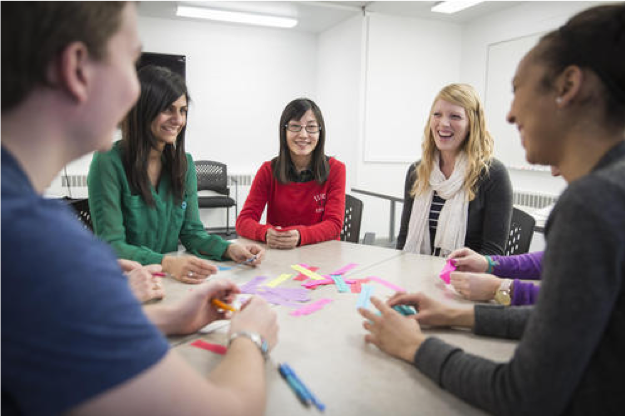
At uni, your lecturers and tutors will have certain expectations of you and this will differ from what you might be used to in high school or the workplace. It will also differ from discipline to discipline, just to make things complicated. You may also be feeling a little bit out of your depths about what you should expect from your time here. But there are some general rules that I’ll share with you to hopefully put you (at least a little bit!) at ease.
Firstly — because I feel like this is a low-key question that initially confuses some students, but no one really wants to ask – yes, you can call your lecturers and tutors by their first names. We’re pretty casual here, even though most of them will have fancy titles. But, of course, you should still be polite and respectful to them in your communication.
#1. You will attend lectures and tutorials
Attendance and participation changes from topic to topic, and each should make their expectations clear to you on FLO, or in the topic guidebook. I also have a blog about the specifics of what goes on in lectures, tutes and labs!
Some topics may have no lecture attendance requirements so long as you watch the lecture recordings, where others may have make up tasks if you don’t attend physically, but only watch online. This should be made clear to you either on FLO, in your topic guidebook or in class. And remember, if you’re not sure, just ask!

Most tutorials and labs, however, do have compulsory attendance. In the majority of cases, you must attend 80% of classes unless you have a valid reason not to do so, such as a sick certificate. You can generally also explain to your tutors if you know you will be absent in advance – say you’ve got a family event in another place – and they might be able to negotiate with you. You can also speak to your tutors if you miss classes for compassionate reasons, or you can seek support from Health and Counselling or your ISSOs if you need someone to advocate for you if you are unable to attend.
If you are an external student, your attendance and participation will be different. You’ll be expected to watch lectures and online content, and as you don’t have face to face class time, you may be expected to engage in online discussions with your peers in the FLO discussion forums.
#2. You will be prepared and participate in class
Your lecturers and tutors will also expect you to attend your lectures and tutorials prepared. Some topics will have weekly required readings, but they may also have recommended readings. The recommended readings are not compulsory, but they are there to help you if you need extra information, and can be really good sources to look to when it comes to researching any assignments you might have. Take notes, not only so you can participate in class, but so you’re prepared for upcoming assessment and so you learn the content better. Make sure you check FLO or your topic handbook to see if you are expected to attend having completed particular readings, or having prepared some thoughts.

Participation means that you aren’t just physically present, but that you contribute to class. Tutorials and seminars are designed to be inclusive, active learning spaces, and a place where your knowledge and understanding of topic ideas is valid. So don’t be afraid to speak up! Sometimes, participation is also graded. Again though, if there is any reason why you can’t participate in class, see your ISSOs or Health and Counselling and they can help you negotiate how you will be assessed in this area.
#3. You will be an independent learner
Your lecturers and tutors will expect you to be able to manage your time and your learning independently. This means that you will plan and manage your time, you will know when you have assessment coming, you will check FLO and your handbook for anything you’re unsure of and that you’ll ask questions if you don’t know something.
It also means that if you know you need extra time for assessment, you’ll apply for an extension, and if you’re falling behind you’ll seek help. Like I said in my previous post, being independent doesn’t mean being alone. It just means you need to speak up. If you’re having trouble managing your timetable, come and see me or your YTP tutors and we can help you get on top of this, or you can speak to Heath about strategies if you’re struggling to keep up.
They will also expect you to be active in your communication and that you will check your emails and FLO announcements and discussion pages for updates. Your lecturers and tutors don’t get a lot of face to face time with you and so a lot of their communication will come through these channels. If you forget to check your emails or FLO, you might miss important communication, and not checking isn’t seen as an excuse.

Part of independent learning also means that if you drop off their radar – if you stop attending classes, or don’t submit an assignment – they probably won’t chase you up. If you’re struggling, you just need to communicate that with them. Often there are hundreds of students in a topic, and if you don’t speak up, they might not know that you’re experiencing difficulties. This doesn’t mean that you’re alone though – you just need to make your needs known!
Independent learning also means that they probably won’t read drafts of your work. But, if you need academic support, you can get it from your YTP tutor, from me, or from the good folk at the Student Learning Centre.
#4. You will conduct research and use the library resources
When you have an assignment, your tutors may not give you specific readings for your research, or tell you where to find good sources (though, some may). They will expect that you will do most of your research by yourself. This can be quite daunting, as if you’ve never used the library databases before, figuring out how best to use key words, or figuring out which types of sources are appropriate and why can be really hard.

As with everything else, I will have a video about this soon, but you can also book in a half an hour session with a librarian and have them show you how to use the system. Take advantage of this, seriously!
#5. You will follow formal academic conventions in your assignments
I don’t want to freak you out about this one, as I will have lots and lots of content coming up about what this actually means, but just as a teaser, you will be expected to engage in academic conventions in your writing and learning. This changes from discipline to discipline, but generally speaking, it means writing in formal academic language, using appropriate referencing and citations, and following the structures of certain academic forms, such as essays, reports, reflections or summaries.

#6. You will be honest in your work and abide by academic integrity standards
If you’re unfamiliar with the university’s academic integrity policies, click on the link and watch the videos. In a nutshell, academic integrity is about being honest in your work: honest about what ideas are yours and where your information has come from through accurate referencing, not passing off someone else work as your own, not cheating in tests or exams and not helping others to cheat.
I will have a video about academic integrity and referencing soon, so don’t panic. But it’s important to familiarise yourself with the policy, and learn the referencing system of your discipline. These change from topic to topic, so you may need to learn a few. The most common across the university are Harvard and APA, and I can show you how to figure them out.
#7. You will be respectful and act in accordance with Flinders University values (and expect the same in return!)
Now this one probably goes without saying, but your tutors expect you to be respectful of them and of your fellow students. This means your phone will be on silent, but also that you will listen respectfully to your peers and engage in appropriate critical debate with them. When you communicate with your lecturers or tutors, try to do so within office hours (and don’t expect a response from them outside of office hours). Be thoughtful and considerate in your emails and you’ll have a much better chance of them replying to you in kind.
Importantly, the university is a safe space. It is expected of all students that they will not attack or discriminate against a fellow student or your lecturers based on their race, gender, sexuality, religion or abilities.
If you are the subject of discriminatory behaviour, there are support networks in place to help you out. Flinders has equal opportunity policies and if you feel these are in breach, you can confidentially contact Flinders’ equal opportunity advisors. We also strongly encourage you to come and see us at Yunggorendi. The whole team here will support you. You can also access advocacy at FUSA, and we have Heath and the rest of the Health and Counselling Team that you can go to.
And don’t forget to subscribe!


